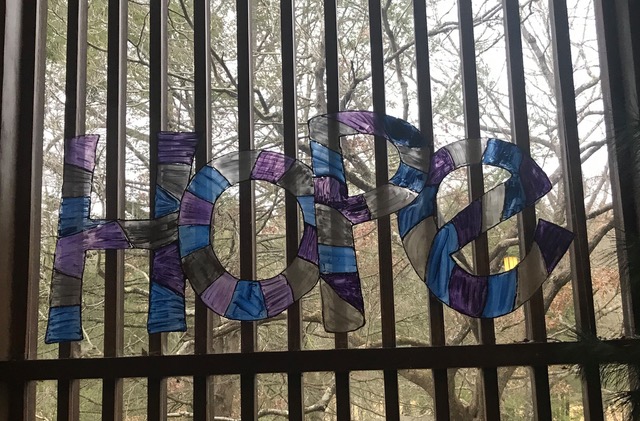Waging Hope: A Field Guide
Let me begin with a confession: I have never been more fearful for our country or our shared future than I am right now.
(Stick with me, it gets better. But first I need to establish some context.)
The Belgian poet and Nobel prize winner, Maurice Maeterlinck, once famously said that, “At every crossroads on the path that leads to the future, tradition has placed ten thousand men to guard the past.”
In our case, all ten thousand of those men are white, and a growing number of them are heavily armed.
The past they are protecting is one in which men who look like them owned or controlled everything, including, not so long ago, the right to own other human beings and to demand complete submission from their wives and daughters.
The future these men are determined to resist is one in which every American, regardless of race, creed or gender, is treated equally before the law, and by the police, by the Church, by lending institutions, by employers and schools–the list goes on and on and on.
Everyone equal, everywhere, always. Yes, that is the American ideal. But to me, that also sounds like the Realm of God, as preached, taught and revealed to us by Jesus.
That’s what these men are resisting because in that America, men who look like them are no longer in control of everything. And that scares them, and angers them. So they take to the streets, dressed in camo, toting their pepper spray, paint ball guns and AR-15s, geared up to guard the past.
This year, the future is on the ballot
That future they are so very afraid of is on the ballot this November. So it’s quite possible, perhaps even likely, that the next two months will be highly chaotic and disruptive — and, possibly, deeply frightening.
As I see it, we have two choices in response:
- We can surrender to our fears, pull the covers over our heads and just wait out the next two months, in the hope that by some miracle the outcome and the aftermath will not be as devastating as we are perhaps expecting it to be.
Or, because that miracle is not coming, this is our other choice:
- We can rise to meet the challenge ahead of us.
Channel your inner David, or Peter, or Rosa
If that makes you feel tired, or angry, or sorry for yourself, I’ve got some questions for you.
Do you think David was afraid when we walked out onto that plain armed with a slingshot and a rock to take on Goliath?
True, the young shepherd boy was possessed of an unusually deep and durable faith in the power of Yahweh to save him. But his opponent outweighed him at least two to one, and on top of his sheer size, Goliath was a heavily armed, highly experienced warrior.
Pretty safe bet David was borderline terrified. But he stepped out onto that field anyway, and into biblical history.
Or how about the disciples?
Their charismatic leader has left them to carry on his work all by themselves. And, oh yeah, they just happen to be surrounded on all sides, in every direction, by THE ROMAN EMPIRE, a regime whose leaders — and heavily armed soldiers — have proven themselves to be only too happy to employ lethal measures to guard the past and to suppress their tiny little love-based insurgency.
If you think they weren’t scared, you haven’t read the story.
But here’s the thing: if you’ve ever been to church even once in your life, that experience was made possible because those terrified disciples transcended their fears and stepped out in faith to meet the challenges that awaited them.
What about Dr. King or Congressman Lewis or Rosa Parks?
Do you think they were ever afraid to drink from whites-only fountains, to sit in whites-only bus seats, to march on what were, in effect, whites-only roads or cross whites-only bridges in their ongoing quest to be seen by the general public, and treated by the courts, like full human beings — knowing full well that they were going to be met by ten thousand very angry men determined to guard the past?
Yes, Martin Luther King, John Lewis and Rosa Parks were civil rights heroes. But they weren’t heartless machines. We’re they ever scared? You know they were. But they drank from those fountains, sat in those seats, marched on those streets and crossed those bridges, anyway. And in doing so, they made America better, greater.
Waging hope is hard but you can do this!
The hard truth is that waging hope requires courage. I genuinely wish it didn’t.
I wish you could just join a Black Lives Matter march and wave some banners around, or post a sign in your yard in support of your preferred candidate, or paste a bumper sticker on your car declaring (admirably) that you’re for the separation of church and hate and be done with it.
I wish that those actions alone would be enough to get the job done of helping to give birth to what amounts to a new and better country, that they would be enough to usher in the realm of God, and the reign of God, on earth as it is in heaven.
But they’re not enough. So here is my brief, five-point field guide for waging hope in scary times, and getting the better of those ten thousand men sent to guard the past.
- Stay well-fed, well-hydrated and (as much as you’re able) well-rested. We’ve got work to do. That work is going to ask the best of us, and require all of us to join together in doing it.
- Nurture your soul along with your body. Pray or meditate or worship in whatever way works for you. Go to church online. Do yoga. Take hikes. Pet dogs. Play with children. Ride your bike. Paddle your canoe out on the river. You will come back nourished and energized — and more hopeful.
- Avoid online click-bait that forecasts doom. In an election year, news outlets have to find something to write about. And readers will quickly tire of stories that cite the same poll numbers over and over again. Already I’ve seen a raft of stories predicting that the polls are wrong and that we’re headed for a repeat of 2016. That is clickbait. Don’t bite. It’s the easiest way to avoid activating the trauma that you may still from last time.
- Tune out angry voices. On Twitter, I recently unfollowed an author whose books I have read and enjoyed because his tweets conveyed only one note: outrage. Mind you, I believe that righteous anger — about a lot of things — is justified at this moment in history. But there is a thin line between outrage and rage rage, and the line between rage and hate is thinner still. Hate is toxic and if you give into it, something vital and essential in you will surely die. Interrupt that cycle early; find thought-leaders and political leaders and faith leaders who speak words of hope, and follow them and be inspired by them.
- Spend time in the company of a supportive community. Hard to do during COVID, but not impossible. Maybe that’s an online faith community, or group of online stamp collectors, or a socially distanced hiking club. Whatever it is, find some group larger than yourself to be a part of, one you can contribute to, and one that offers you support and collegiality in return. That exchange will serve to nourish you and bolster you.
But perhaps above all else, remember that we are in this together, and together, by God’s grace, we shall overcome.
Rev. Dr. Steve Runholt
srunholt@warren-wilson.edu

